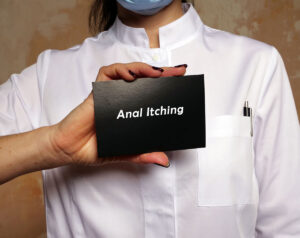Conditions And Treatments
Home / Areas Of Specialty / Pruritus Ani Or Itchy Anus
Pruritus Ani Or Itchy Anus
Pruritus Ani Or Itchy Anus is a condition in which there is significant itching or irritation in the skin around the anal area. Although It is more common in the males in their 40s to 60s but it can affect any age patients. There are many different common reasons that can cause this condition. It is also known as “Itchy Butt”.

You may have Itchy anus or Itchy butt because of following reasons:
- Different problems in the Anal area such as hemorrhoids, anal fistulas, infections, sexually transmitted infections, skin conditions such as psoriasis, contact dermatitis, hidradenitis, anal fissures and rarely cancer of the anus among few conditions.
- You can also have itchy anus with excessive and aggressive cleaning of the anal area with the soaps, wipes, use of perfumed soaps or cleaning agents, lotions and creams. It can also cause a burning sensation around the anal area.
- Another common reason is dietary factor, as use of coffee, tea, sodas, carbonated drinks, food with the high acid content. Besides foods like orange juice, lemon juice or other acidic food, use of milk products, cheese, tomatoes, seeds and nuts and alcohol can cause this problem.
- You can have this condition as a result of conditions like HPV, anal warts , pin worm infestation. Sometimes fungal infections can also contribute to anal Itching.
Symptoms and Signs of Anal Itching
2. Irritation around the anal area
3. Burning sensation around the anus
4. Soreness around the anus
5. Excoriations and scratch marks around the anus
6. Thick skin around the anus
Can hemorrhoids cause itchy anus and how do we treat them?
As mentioned before hemorrhoids is one of the causes that can cause itchy butt. Rubber Band ligation of hemorrhoid is a quick office procedure meant to treat only internal hemorrhoids. There are two main types of hemorrhoids -Internal and external. Rubber banding is a very quick office procedure where your surgeon will insert anoscope inside the anus and visualize the internal hemorrhoid. Your surgeon will then place a band on the internal hemorrhoid with the help of special device. However, you may have minimal discomfort, but it rarely causes severe pain. Eventually, rubber band will cut off the hemorrhoid’s blood supply. This will cause the hemorrhoid to shrink and fall off. It usually falls off in 1-3 days.
Colorectal surgeons can perform this procedure in the office. This does not require any sedation anesthesia and patients can go about their daily activities right after the procedure. Very rarely you may have severe pain, bleeding, infection or fever or other symptoms. Additionally, your surgeon may repeat the procedure two to three times to shrink the hemorrhoids and for maximum effectiveness.
How to Prepare for the Rubber Banding procedure
Your Surgeon will give you details instructions in regard to side effects and the risks like any other procedure. Please read the instructions before the procedure and ask any questions.
What are Hemorrhoids, Can you please explain ?
Hemorrhoids are a part of normal anatomy of human body. They are present in the anus which is the last part of human large intestine. Hemorrhoids are also known as Piles. They consist of blood vessels and connective tissue and work as cushions during bowel movements. Enlarged hemorrhoids can cause stretching of blood vessels and lead to bleeding.
Types of Hemorrhoids
External hemorrhoids are outside the anus on the skin. You should not have any bleeding or pain unless they have thromboses/blood clots. That condition is called thrombosed external hemorrhoids and they can appear as a lump in the anal area. This can cause significant pain, discomfort and occasional bleeding. Your colorectal surgeon should be able to treat this condition with a small procedure in the office. It usually leads to faster recovery.
Internal hemorrhoids are inside the anal canal and can lead to significant Bleeding, protrusion, thrombosis, pain.
Does Rubber Band ligation of hemorrhoid work for the External hemorrhoids?
Colorectal surgeons perform this procedure only for Internal hemorrhoid management. External hemorrhoids which are on the outside skin which is sensitive area and banding does not work. Excisional hemorrhoidectomy surgery is the procedure meant for External Hemorrhoids. In excisional hemorrhoidectomy your colorectal surgeon can remove both internal and external hemorrhoids at the same time. But this procedure requires anesthesia and can have a painful recovery.
What should I change in my diet and lifestyle to prevent and treat hemorrhoids?
Hemorrhoids are swollen veins in your anus and lower rectum that can cause pain, itching, bleeding and discomfort. They can be caused by various factors, such as straining during bowel movements, sitting for long periods of time on the toilet, having chronic diarrhea or constipation, higherweight, being pregnant, having anal intercourse, eating a low-fiber diet or lifting heavy objects.
To prevent or treat hemorrhoids, it is recommended that you eat more foods that are high in fiber, such as fruits, vegetables, grains, beans, nuts and seeds. Fiber can help soften your stools and make them easier to pass, reducing the pressure on your hemorrhoids. Fiber can also help reduce inflammation and bleeding. Some examples of fiber-rich foods are:
- High-fiber bran cereal
- Shredded wheat cereal
- Pears
- Apples
- Raspberries
- Prunes
- Green peas
- Collard greens
- Sweet potatoes
- Potatoes with skin
- Winter squash
- Navy beans
- Pinto beans
- Kidney beans
You should also drink plenty of water and other liquids to keep yourself hydrated and have a good bowel movement.
On the contrary, you should limit food low in fiber like cheese, dairy foods, any kind of meat, alcohol, caffeine and refined food.
Diagnosis And Treatment for Itchy butt or itchy anus
It is usually recommended to see a colorectal surgeon for the evaluation of the condition and appropriate treatment. You will need a local physical examination of the anorectal area with visual inspection, anoscopy evaluation and sometimes biopsy of the skin. It is very important to be able to find the etiology to have an appropriate treatment.
Most common aspects of treatment include ;
– Avoid excessive cleaning (overcleaning) around the anal area and avoid use of wipes with chemicals, steroid creams and other over-the-counter medications unless prescribed by your colorectal surgeon.
– You should also have an evaluation of the anal area by your colorectal surgeon and a discussion with your surgeon regarding the possible etiology.
– Avoid certain foods after discussion with your colorectal surgeon and as recommended based on the etiology.
-Basically, you need to have a detailed evaluation with your colorectal surgeon .This way your surgeon can diagnose the etiology and treat the condition especially infections like fungal infections and pinworms or HPV infections.
What is a colon and Rectal Surgeon? Is Dr Singh a Board-certified Colorectal surgeon? and where does he perform his procedures.
Colon and rectal surgeons are experts in the surgical and non-surgical treatment of diseases of the colon, rectum, and anus. They have completed advanced surgical training in the treatment of these diseases, as well as full general surgical training. They are well versed in the treatment of both benign and malignant diseases of the colon, rectum, and anus and are able to perform routine screening examinations and surgically treat conditions as and if needed. Dr Singh is a double board certified in Colon and Rectal Surgery and General surgery. His practice is located in Phoenix, Glendale and Scottsdale, AZ.
For more information on this topic please visit:
Pruritis Ani Expanded Version | ASCRS (fascrs.org)
Hemorrhoids – Dr Neeraj Singh (colorectaldoc.com)
Home – Welcome To The Colon And Rectal Care Center Of Phoenix! (colorectaldoc.com)You can avoid

